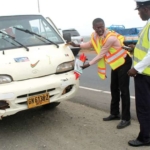
A few months ago, I came across a long queue of vehicles stopped by the police and the Driver and Vehicle Licensing Authority (DVLA) along the Haatso-Atomic Road.
Their offences? Expired roadworthy stickers, no fire extinguisher, spare tyre, broken lights among others. The offending drivers were made to pay a spot fine of GHC 225 for every offence.
On the face of it, this sounds like good road sanitation— an effort to instill discipline on roads where chaos often reigns. But look a little closer and one sees a troubling contradiction: while the DVLA penalises drivers for minor faults, countless traffic lights across the country lie dead or malfunctioning, causing accidents and costing lives.
At major intersections on the Graphic Road, the Kwame Nkrumah Circle, Mallam-Kasoa road, Ogbojo all in Accra; and others in Kumasi, and Takoradi, lights blink erratically or fail altogether, turning crossings into arenas of confusion.
Cars edge forward nervously, trotro drivers rely on instinct, and pedestrians gamble with fate. When these lights go dark, the city doesn’t just lose order — it loses lives. Yet, amid this dysfunction, enforcement officers stand ready with their tickets and fines.
The DVLA’s campaign is not inherently wrong. Road accidents remain one of Ghana’s biggest public health concerns, and poorly maintained vehicles play a part. Holding drivers accountable for basic safety requirements is essential, but enforcement without system maintenance is like patching a leaking bucket while ignoring the hole at the bottom. It becomes an exercise in appearances rather than impact.
We can’t call most of roads car worthy, yet the DVLA collect millions every month from road users in roadworthy levies.
If the DVLA’s mission is truly about road safety, then it must operate within a broader ecosystem that actually supports safety. The current situation sends the wrong message: citizens are being punished for individual failings while government agencies escape scrutiny for institutional negligence. A driver’s expired fire extinguisher may pose a theoretical risk, but a dysfunctional traffic light poses an immediate and collective one that has actually kills dozens of people.
There’s also the question of transparency. Each GHC 225 fine adds to a growing pot of revenue. But how much of that money is reinvested into fixing faulty signals, repainting road markings, or funding public safety education? The public rarely knows. Without clear accountability, the fines begin to look less like deterrence and more like revenue collection — a form of bureaucratic tolling disguised as law enforcement.
The National Road Safety Authority which has the responsibility ensuring these institutions are held accountable for their failures is equally docile. The broken traffic light near the Orion Cinema at the Kwame Nkrumah Circle has been in that state for almost nine years. Yet nothing, absolutely nothing has been done about it. Same for the Graphic Road. Same in many other places.
The problem reflects a deeper flaw in Ghana’s governance: fragmented responsibility. The DVLA operates under the Ministry of Transport. The maintenance of traffic lights, however, falls to the Ministry of Roads and Highways and various local assemblies. This division allows each agency to shrug off blame when systems fail. The result? A patchwork of authorities enforcing rules none of them fully sustain.
Imagine if the energy poured into fining drivers were redirected toward preventive measures — auditing road safety infrastructure, maintaining lights and signage, and ensuring roads are navigable. Prevention, after all, saves more lives than punishment ever will. A functioning traffic light, unlike a police checkpoint, keeps order continuously and without bias.
And this is not just about logistics; it’s about fairness. A just society demands reciprocity — citizens obey the law, and the state ensures the conditions to make that obedience possible. When that balance breaks, law enforcement becomes exploitation. Drivers see officials not as protectors of order but as agents of extraction and oppression.
The irony is painful. Ghanaian drivers are required to keep reflective triangles, seatbelts, and roadworthy papers in order — yet they drive through intersections governed by darkness, guesswork and being assertive. The state enforces individual safety while neglecting collective safety. It’s as if citizens are being held responsible for surviving a system that keeps endangering them.
The cost of inaction is far greater than the GHC 225 fines. Accidents triggered by non-functioning traffic lights strain hospitals, increase insurance claims, and devastate families. The loss in productivity and economic output from preventable road incidents runs into millions. Every broken light is not just a technical fault — it’s a symptom of misplaced priorities, inefficient bureaucracy or dereliction of duty.
If Ghana’s authorities are serious about road safety, the fix is both literal and symbolic: fix the lights. A working traffic signal restores confidence in order; it shows citizens that governance is not just about punishment but partnership. Once that trust is re-established, enforcement will feel like justice, not harassment.
In view of the erratic and unreliable supply of power, we need to consider alternative power source for the traffic lights as is the case of Republic of Benin.
Until then, the sight of a malfunctioning light beside a team of officers collecting fines will remain the perfect metaphor for the state of governance: bright uniforms enforcing a dimly lit system.
The author is the Immediate past President-General of the West Africa Nobles Forum and Chancellor of the Wisconsin International University College.